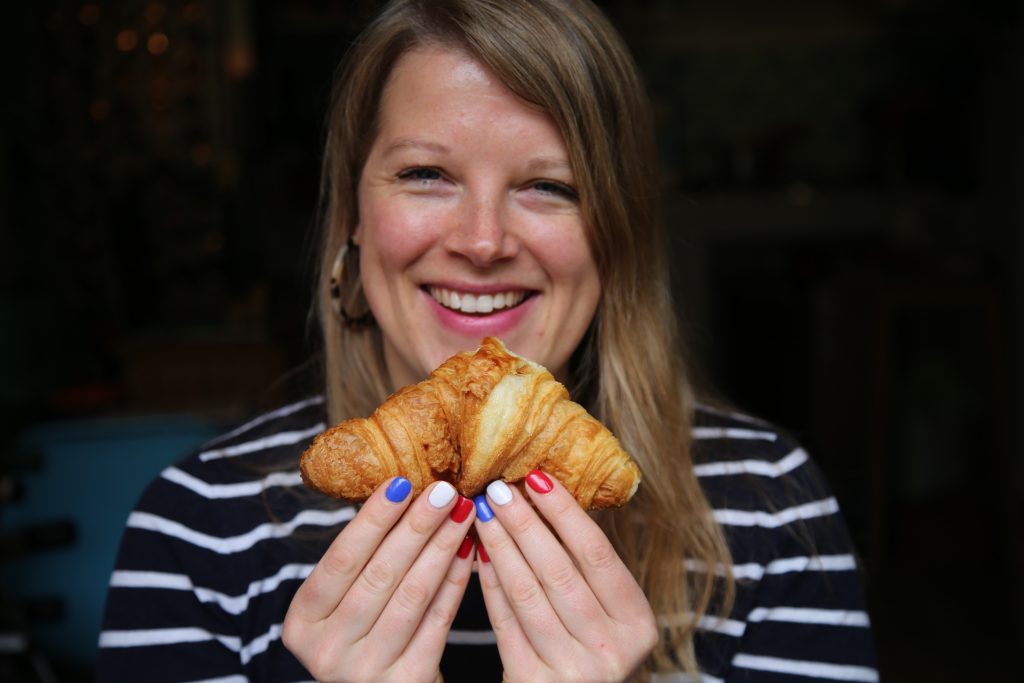
As the author of the weekly Guardian column ‘How to make the perfect…’ Felicity Cloake, at a mere 36 years old, is fast reaching national treasure status. Fair-skinned with laughing eyes, originally from Hertfordshire, she lives in North London on the Caledonian Rd. With the publication of her latest book ‘One more croissant for the road’, a travelogue of eating and cycling through France, I went to talk to her.
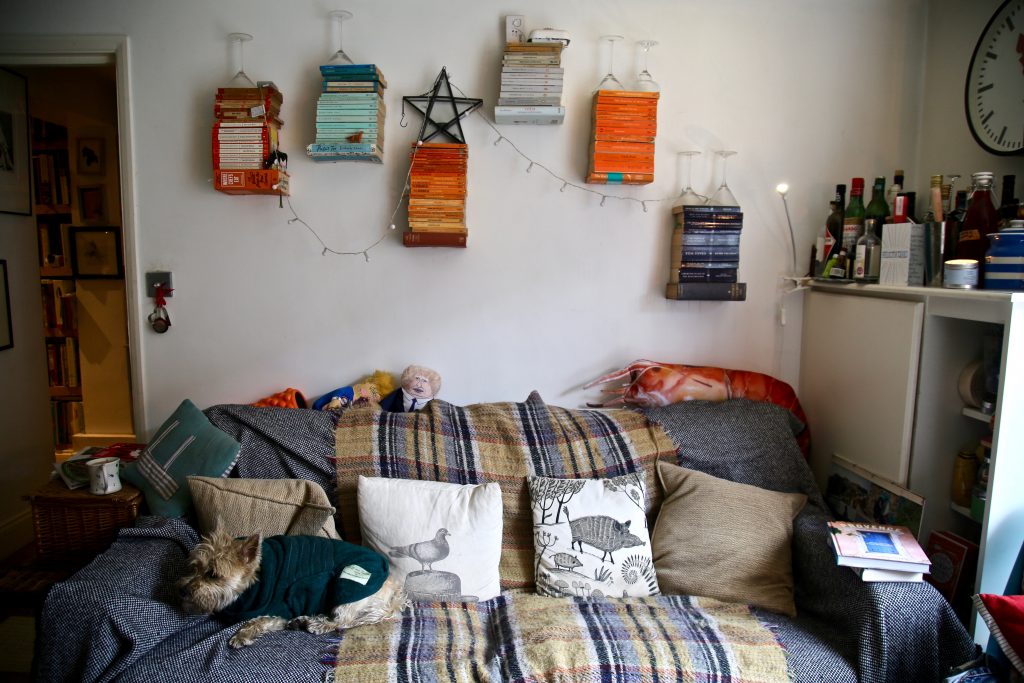
If somebody did ‘Through the keyhole’ at Felicity’s home, it wouldn’t take long to guess who lived there. The passageway is lined with cookbooks, the side of the fridge covered with magnetic spice containers, books are stacked everywhere. The kitchen, where she does her recipe testing, is small but well-equipped. The sofa is peppered with cushions depicting food or political caricatures like Boris Johnson or Donald Trump. Dogs are ubiquitous, on the walls and in the person of her adored Cairn terrier Wilf. Outside there are two bikes and a stack of (empty) quality wine bottles.
North London
Felicity: I’ve lived in Caledonian Road flat for five years. I’ve been zigging around North and East London for 20 years. I grew up in Hertfordshire but I’d never go back. I love North London.
The Guardian is less than five minutes walk away from here. I cycle to Hampstead, with my dog Wilf, and go to the farmers’ market in Parliament Hill. I love Hampstead Heath. With my dog, it’s my happy place. I love swimming there. I love the Ladies Pond; it’s very freeing.
Caledonian Road used to have good shops but some of them are closing. I think the Cally has slightly lost its identity. A lot of the older shops have gone now. So much money is being pumped into Kings Cross. We’ve got a great Asian shop, which has every spice.
The Cally, Barnsbury, Clerkenwell – it’s all very Italian, that diaspora.
Also Welsh Clerkenwell… there used to be a big Welsh church on Pentonville Road and the Welsh centre on Greys Inn road. A lady told me how a lot of the kids only spoke Welsh.
I go to Amwell Street for lots of stuff. Gazzano’s has gone on Farringdon Road, now it’s a Greek deli. There used to be a really great Italian deli on Penton Street. The little specialist shops just go. I don’t know what’s going to happen in the Cally.
There is a good butcher down in Clerkenwell. I use the French deli in Camden passage. I also love Stoke Newington, it’s got a real community, I think because it doesn’t have a tube. I like London Fields market. Barnsbury, where I live, is great.
You are around the corner from Tony Blair’s old house…
Oh yes, and Emily Thornberry. I see Boris Johnson cycling around. There is so much going on here.
One of the great things about London is everybody lives cheek by jowl. Rich and poor. Paris, poorer people are a lot more pushed out to the banlieu. North London is very good at that. Everyone is on the same bus.
Felicity’s start in food writing
I studied English language and literature at university. I know how to use a semi-colon (although I’m more of an en dash person). I’m a bit of a pedant about grammar.
From there, I went into book publishing. It’s very hard to get a job in publishing but I loved reading and writing. I ended up in Phaidon on the Regents Canal near here. They were doing their first cookery books. But it was more project management.
All the creative things I thought I’d be doing – that wasn’t my job, it was farmed out. I could see it wasn’t going to be for me. So I left and I did a lot of work experience at magazines, not just food magazines. Food seemed to be getting big, this was the mid-noughties, The Guardian website had amazing food content. I worked for Delicious, Olive, Waitrose food magazine, BBC Good Food, Wallpaper travel and Fresh, which is no longer going.
How did you afford that? There’s this whole issue about internships.
I would only do it for two weeks at a time and temped in between. If it’s a traineeship, they didn’t have to pay minimum wage. They actually brought this up at the interview: ‘You are aware of the salary. What are your plans for living?’ I was fortunate because my parents had moved to London by now. But this doesn’t exactly help diversity!
After the work experience, eventually Fresh magazine offered me a job as a sub-editor. It was a small team, and I got to do so much great stuff with them. I did my wine qualifications there, the WSET and the Advanced. I thought about doing the Diploma but after Advanced it gets quite technical, how to prune vines. Which is not my thing. I’m more interested in the blind tasting. Best exam I’ve ever done.
In 2008, around the financial crash, I met a woman from the Guardian who said to me, if you ever want to write for us, send me some ideas. I’ve loved the Guardian since I was at school. I probably would have paid them to publish my stuff. I thought she said they paid £5 for an article, actually it was £85.
I did a column about manners, another about food myths. Then we did a piece on ‘how to cook a sausage’. There were hundreds of comments underneath. And we thought, oh, we are on to something here. So the ‘Perfect’ column started in 2009. It’s now a decade. I should commemorate it. It wasn’t in print initially, just online.
When I saw it in print, I was working at the Metro at the time, I saw a photo of my scone on the front page of the Guardian. I could not have been more delighted. It made my year.
Do you find it hard to make a living as a food writer?
Erm… not hard to make a living but it doesn’t pay what the professions pay. It’s a very nice job, something that a lot of people do as their hobby. But you have to work very hard. You have to put in the hours. I was up until late last night making the sixth iteration of ricotta and spinach cannelloni. I’ve eaten nothing else for days.
You do end up working longer than the normal working week. If you are prepared to work hard, you can do it. You can’t have your eggs in one basket. You need to be able to take on anything. You can’t be proud or that fussy. I say to people who attend my food writing classes: be prepared to write for anyone who will hire you. Being too idealistic will not butter any crumpets.
I’m not staff at the Guardian, I have a weekly column for them and I do a monthly column for the New Statesman.
I earn money from books. Bits of royalties come in. Dribs and drabs. It’s not a massive money spinner. For the French book, it was something I genuinely wanted to do; it wasn’t the cheapest trip. I was camping a lot, but food in France is expensive, hotels are expensive, trains are expensive.
Felicity’s food writing masterclasses
I teach food writing for Guardian Masterclasses. I got into this via print. My classes, they ask about nuts and bolts and pitching. I can tell them that. But I couldn’t give them an online strategy. I recommend your book ‘Get Started in food writing’.
Thank you!
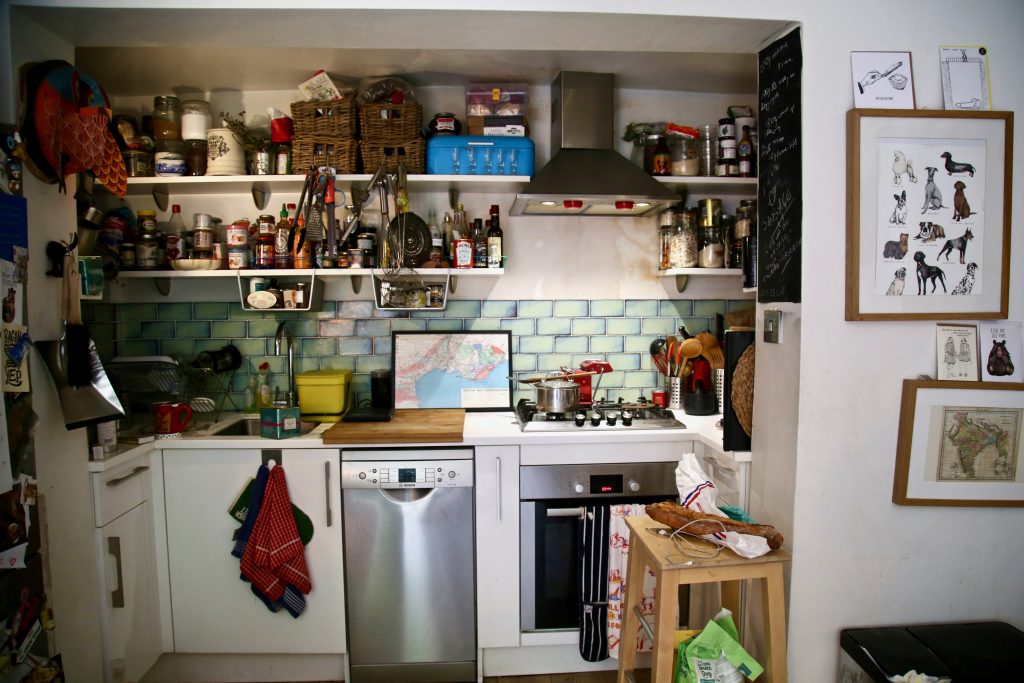
The Guardian Perfect column
I love geeky food articles. Do you think there is a market for it? As a food geek yourself, do you feel frustrated by not being allowed to go as geeky as you’d like in the Guardian?
There isn’t as much as in America. I hoped that the internet would lead to more geeky food writing because you have as much space as you want online. For the ‘Perfect’ column, for the online one, I write everything I want, then I cut it down to 700 words for print. If you only want the recipe, that’s fine, but go online for all the geekery behind it.
How long does it take you to write each ‘Perfect’ column? It looks like a lot of work.
It depends on what I’m doing. The week we did ramen, it took me two weeks as I had to make all these different stocks and simmer them for three days. I’ve got to make six of these things and then a seventh ‘perfect’ one. Drink ones, which I don’t do anymore, I could knock them up in an evening.
Usually it’s a day shopping and research. I don’t do online shopping, really. I like to go and look at the ingredients. A couple of days testing. Then a day writing it up.
So one of those columns is almost a week… like, four days minimum. I wonder if people realise.
I do get quite a lot of emails. I like that. Someone sent me a long email about how their grandmother used to make pistou soup. I also get the people saying, ‘I can’t believe you get paid to do this’.
It’s a really useful resource. You’ve given all the obstacles in advance.
It sounds quite didactic, ‘the perfect’. But the recipe I give will work because I’ve made it.
You are a national treasure because of that.
(Laughs.) I always test at least five recipes but it can be up to ten recipes if they don’t take very long.
Do you find that any don’t work at all?
Yes. But if you cook a lot, you get a sense of whether it will work or not.
Do you ever grass them up?
Sometimes. No-one is setting out to make people waste money on ingredients but I don’t think most recipes now are independently tested. There isn’t enough money sloshing around.
I love blogs because of the feedback. I’ve even seen BBC recipes that don’t work.
I had one of those recently where the cooking time was wrong. But for the most part, things work. I even had that with a Delia recipe. A steamed pudding, it just wouldn’t set, I’d been steaming for like 3 hours. I thought, it can’t be Delia’s fault. I think it wasn’t properly sealed. Sometimes it’s better to trust Delia than yourself.
France
My parents own a place near Grimaud. The food isn’t very good around there.
The Cote d’Azure area is so transient. I cycled through Port Grimaud and I found the Cote d’Azure so much more Russian, lots of Russian number plates and estate agents boards. It’s always been a rich and transient population.
I had a friend who lived in Saint Tropez. Although it was beautiful, she said it was like Disneyland. They closed down the school, the hospital; it’s all second homers. I was quite surprised in the book when you said ‘The Var is my favourite area’.
I love it. My parents used to live there, but inland Var, for half the year. When they moved there, there were some Norwegian people in the village and that’s it. It’s not the Provence that people think about. It’s not anglicised. It’s not the villages that have their own cricket team and all that.
I see a new book ‘Provence’ by her friend Caroline Craig nestling on the arm of the sofa. This looks good!
It’s not cheffy. It’s great. It’s stuff we’ve never seen before. Recipes from her papy (grandfather). And there will be Alex Jackson’s book, the chef from Sardine, a restaurant near the Angel, soon.
When I got to Marseilles in the book, I went to lunch in France at Jonathan Meades‘ house. It’s not that the cooking in France is better but the raw ingredients are so much better. If you keep it very simple. I went to his apartment, which is in a Le Corbusier building. He made a salad and served some saucisson, some cheese. The best strawberries. One square of dark chocolate.
In the book you ask: ‘Where do all French children buy their penny sweets?’ I think they don’t.
They do in the supermarkets. Everything in France is either very very niche or very very big – grand surface.
We buy the most amount of small chocolate bars in the world. But in France, you give them chocolate sandwiches for the goûter. They don’t snack as much as we do.
It’s so puzzling why the French are so much slimmer than us. The thing is, there is a lot of coffee and cigarette consumption…
… and they’ve all got worms.
I didn’t know that.
Yes, when I was pregnant in France, I had a monthly worm test. It’s because of the raw meat and the dog poo everywhere.
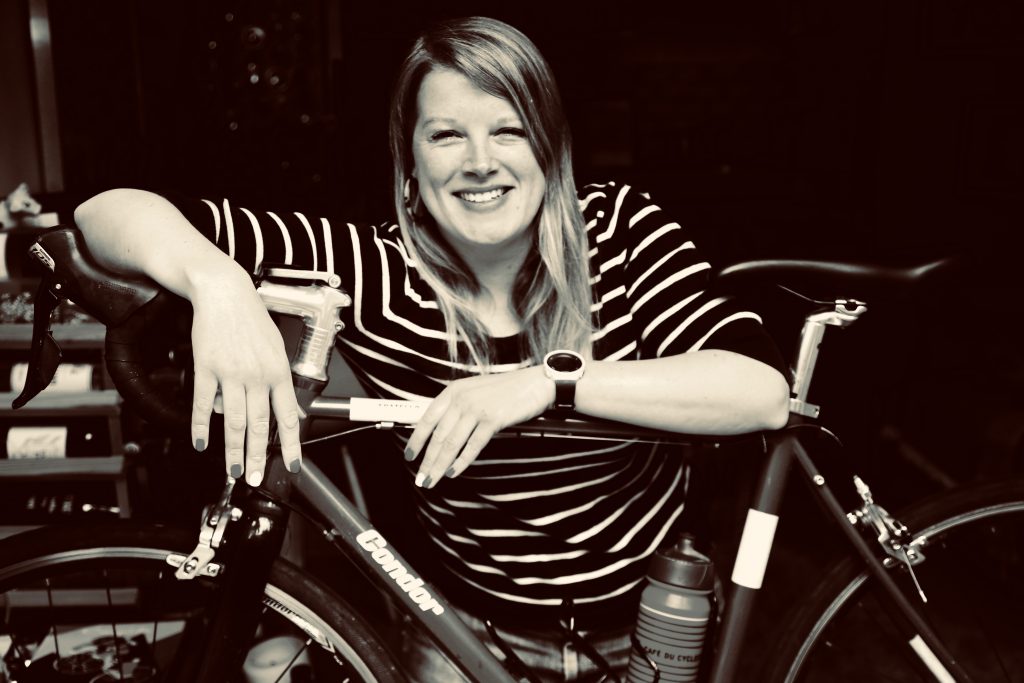
One more croissant for the road
The book is doable for anyone. I can totally imagine going around France with it as a guide. I was underlining all the bits thinking I must go there next time I visit. I like that you were mixing it up, one night camping, one night in a hotel.
There was one night where I blew 150 Euros for a night in a faded Casino hotel. As an experience, it was hilarious. I booked it online. I’d had a terrible day and I thought screw it, I’m just going to throw money at it. I went in, I was expecting a glamorous hotel, but it was like Las Vegas, the slots. The room was huge as the only thing they had left was a junior suite. It wasn’t as nice as the Irish pub I stayed at near Cannes. I didn’t get bed bugs though.
So I went from one extreme to the other. My tent was a bodybag, I had to crawl into it.
I felt the book was very rushed.
Yes. That’s the thing I regret about it, I would have liked to have taken six months rather than six weeks. But realistically I have a mortgage to pay, I’ve got a weekly column, I had to do two months of column before I went, a dog to find sitters for. I would have loved to have lingered in certain places: France is the largest country in Europe and it felt like it.
It sounds like quite a lot of work, certainly not a holiday. I felt for you, I liked the fact that it wasn’t idealised. That’s the thing about cycling, you can’t skip over the dodgy bits, the Z.I. (zone industrielles).
Google cycle routes always take you through industrial routes because there is less traffic. I must say, as a London cyclist, I found French drivers very courteous. I only had one unpleasant encounter with someone.
When I got back to London, I got to St Pancras with my bike, cycled over to Stoke Newington to get my dog, and had two incidents with people shouting at me or swerving into me. So to the credit of the French, they are very very bike friendly.
What was your top experience?
The area I liked the most was Alsace and Les Vosges, and I really want to go back. I like the wine and the food, which we don’t hear much about here. Germanic food isn’t fashionable here; maybe it’s too close to our cooking tradition. Although Bellanger on Islington Green has that Germanic French food, the choucroute, etc. That was a revelation.
The high for me was when I cycled up the Col de Joux Plane, in the Alps. As an adult, you rarely push your own parameters to that extent. I wasn’t sure I could do it. Is this even possible that I can get up here? At the top, the joy of it. You could see snow.
The ride down into Morzine is actually much scarier. I’m fine going uphill but down, not so much. White knuckle doesn’t even begin to describe it – it was terrifying. It took me 50 minutes to get up and ten to get down. So in Morzine I decided to have a beer and nowhere was open. It was mid-June and even though there is a lot going on in summer, races, etc…
The French are so rigid. Uncompromising about their time off. You were travelling on your own…
For two thirds of it…
Did you learn anything about yourself?
I learnt that it wasn’t scary. I certainly don’t have a problem eating on my own in this country. I have the mistaken impression it makes me look quite glamorous. Something about France and it being quite an old fashioned society did worry me a bit. People say we are standoffish, but even in London people will talk to you. Especially if you have a dog. When my friend Mat left me (after travelling with me the first few days) I waved him off, I suddenly felt – oh my god I’m on my own.
I liked your honesty in the book about that.
I thought, no-one knows where I am. I am completely free to do exactly what I want. That was quite exhilarating. Actually, I found the French great about solo dining. It is quite common to eat on your own in France, and they take longer to eat. They didn’t bat an eyelid when I was in full lycra in their restaurant.
I’m braver than I thought I was, and more resilient. But if you are on your own, you can take almost anything. It’s worse to be with someone that you have to apologise to…
It’s made me more confident in myself. It’s made me a lot less self-conscious, more comfortable. Also talking to people. I’m a journalist, so I talk to people. But I like that courtesy in France where you acknowledge everyone, meeting their eyes in the street. In London, nobody does that. I make more of an effort to chat to people every day. Say hello to bus drivers. It’s made me a more open person.
Are you fitter now? Did you lose weight?
I didn’t lose weight because I ate a lot. I redistributed weight: I did have these enormous Jambon de Bayonne thighs. I can still beat someone up the Farringdon Road, that hill or the Pentonville road quite fast. There is a certain breed of London cyclist, often male, and they will see you as a woman, not in lycra, who pulls out in front of you at lights and I want to say, do you know what I’ve done? Quite often it’s a man on a Boris bike in a suit and I think, hang on. No.
What are your plans next?
I really love long-distance walking. But with a bicycle, you travel fast enough to see things changing and slow enough to feel it. Everything causes you to adjust.
You didn’t have a cooking stove?
No. I decided not to take one. I missed that you get to eat exactly what you want. I was pleased to get back to a cup of tea. But to make a cup of tea, you then need teabags and milk and…
There seemed to be quite a few nights where you were stuck in your tent, eating Pringles while it was raining.
Yes. I needed to be more organised with my emergency rations.
Is that your take away, more emergency rations?
Yes. You want more than chocolate after eight hours of cycling. Someone on Instagram said you should always carry tinned fish.
Did you meet any other lone women cyclists on your trip?
No. Not one. I did a trip in 2017 from Brittany to Séte with a group of women and we caused quite a stir. It’s still more of a male thing.
Did you ever feel unsafe?
The first night I felt quite vulnerable laying there on my own. I got over that quite fast but there was one campsite where I felt quite unsafe.
You’ve just got nylon between you and the rest of the world.
I note in the book you said you’d just split up with someone… a cycling trip is quite good for that, cycle the heartbreak away. Regular daily activity helps get over something.
Yes, you can just be on that bike. Mindless.
What do your parents do?
They are retired. My mother was a language teacher. I didn’t inherit her talent. My father worked for John Lewis for most of his career. He worked there from the late ’60s. It was very interesting; they used to have these great country houses that the workers could stay in with their families. I also worked there when I was a teenager. At that point, it really was very ‘Are you being served?’. We were closed on Mondays.
My mum worships at the altar of John Lewis. I think John Lewis has replaced Marks and Spencers as that sort of safe British shop.
I think they are more innovative. My father worked for John Lewis for most of his career… I bleed dark green.
Never knowingly undersold.
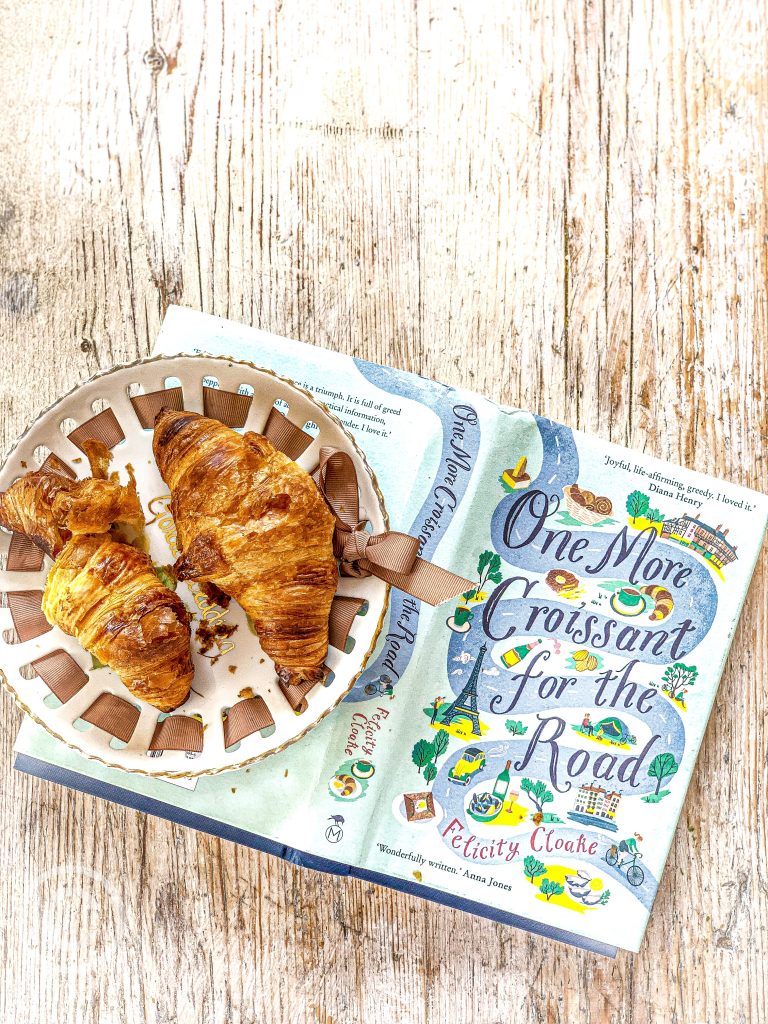
Food and travel books
I’m sure you are going to win awards for this book.
Really? There aren’t many categories in the food and travel. Most people told me not to do it. They said it’s not commercial. I’m lucky enough not to have too many financial responsibilities so I just want to do it. Not everything is about money. Life is too short.
Look at Caroline Eden’s book, Black Sea, by someone who is not even from there. It’s won awards everywhere and how uncommercial is that? No-one wants another general cookery book. It’s just depressing because you see people doing it. I did it. But it’s pointless unless you are on TV.
Appropriation
I’m glad I work in food – it’s not that controversial. Although there is that whole appropriation conversation. Am I too southern to write about Lancashire cheese? Actually, the Irish were very kind about my Irish stew. I come from all over. I’ve now got an Irish passport. I’ve got two now.
Irish passports are a good one to have.
Nobody hates the Irish.
Food trends
I’m not very good at trends. Like we heard a lot about Korean food, how it was upcoming… was it? Not sure.
West African cooking, has that got momentum?
I’m hoping French food is coming up as a trend. There is Henry Harris’s restaurant and Sardine. I think there will be a rediscovery of French food.
We still hear a lot about central Asian and Eastern European food. I wonder if anyone is going to do something with that. There are a lot of good Georgian restaurants. It’s a crowd-pleasing cuisine. Khachapuri, who doesn’t like cheesy bread? Dumplings are very fashionable, khinkali – Georgian dumplings.
German is quite hard, a lot of meat and potatoes. It’s unfashionable and too close to what we were brought up with.
There are more good Chinese restaurants now. We have a really great Szechuan place on Liverpool Road. I don’t know if it’s because of all the Chinese students at St Martins in Kings Cross.
I’ve got Wing Yip up the road in Staples Corner. I love it.
I went round the Birmingham one with Brian Yip. I did a piece for the Guardian. Going around with Brian afterwards, it was like supermarket sweep, I was just chucking stuff in my trolley. I went when they were having their staff meal. Most people were digging into their chicken noodle broth, a few white guys were having sandwiches. But they still have that old fashioned ethos.
Cookbooks and food writing
Any food writing influences?
Nigel Slater was the first person who showed me that food writing could be exciting. We didn’t have many cookery books at home. We had Delia, my granny’s Mrs Beeton. I read Delia cover to cover.
My parents both loved cooking, particularly my dad. But both my parents worked so they couldn’t cook as much as they wanted. We always sat down together and ate together in the evenings. Nigel is so good with words. Food writing in the UK was a little bit antiseptic.
Diana Henry mentioned MFK Fisher- she’s so good on France.
You still read books?
This flat is 90% books and 10% wine.
Where are all your cookbooks?
In the hall. I also have three boxes of cookbooks currently waiting a shelving system.
How do you find which book?
Felicity gestures to an area on the bookshelves…
This is all Italian and this is baking…
So it’s by subject. Not alphabetical.
My French collection was initially a lot smaller; now it is a lot bigger. I get a lot of books. I really like old stuff. I do get sent books but I buy some of them.
I’ve colour-coded mine. I can’t find anything. But it looks nice and tidy.
Probably the general cookery section gets a bit neglected.
Felicity picks up a small brown round package.
This is a washed rind cheese in walnut liqueur. It cost £17. I’m maturing it here on this shelf.
Any ambitions for the future?
I would like to write a novel.
This book was quite a good practice for it.
Yes, it was a different discipline from journalism or cookbooks. But nothing major really. Just to be happy.
Have you achieved most of your ambitions do you think?
I was on the front page of the Guardian with Donald Trump last week. I never thought that would happen. I’m not a hugely ambitious person. I’m quite content with my life; it’s pleasurable.
Croissants and Butter
We discuss the croissants we are eating…
Where are these from?
These are from Au pain de Papy on Grays Inn Road. Little Bread Peddler went off the boil a bit. Pavilion are good. Ottolenghi are good.
Nice tearability.
It’d be good to get these early, then go to Paris, get on the Eurostar and do a comparative, and see how they stack up. I ate some really great croissants in Paris. I didn’t want it to be the best but they were streets ahead.
This is nice texturally but maybe not a lot of flavour.
I like to have something buttery rather than flavoursome. I don’t like the sweetness and saltiness to be too pronounced.
Structurally, it’s beautiful.
It’s also a bit squidgy in the centre. Some places the lamination is so perfect, there is air throughout, so in fact it dries out. When I go to Au Pain de Papy, I find myself speaking French, the atmosphere is so French. Everyone in there is French; it smells French.
Ottolenghi’s have more flavour. They are bigger. Ottolenghi worked as a pastry chef for the first five years in Jerusalem. He cares about the croissant.
I wonder what butter they use and whether that makes a difference? I want to try your recipe.
I was so dumbfounded but it works really well. Why would anyone make their own? But the publishers said you must have a recipe. You could use French butter. Our unsalted butter tastes different from French ‘doux’ butter.
I went to the butter museum in Cork. They gave me a book about the butter trade and how it links into the West Indies.
American butter has a lower butter fat percentage. I don’t know whether it’s the breed of cow they use.
They whip air into it.
British butter is not that different from other European butter.
I thought I’d have to borrow someone else’s kitchen to make the croissants as there wasn’t enough room but actually I just managed. You have to be there every 30 minutes to do the rolling. But it wasn’t that difficult.
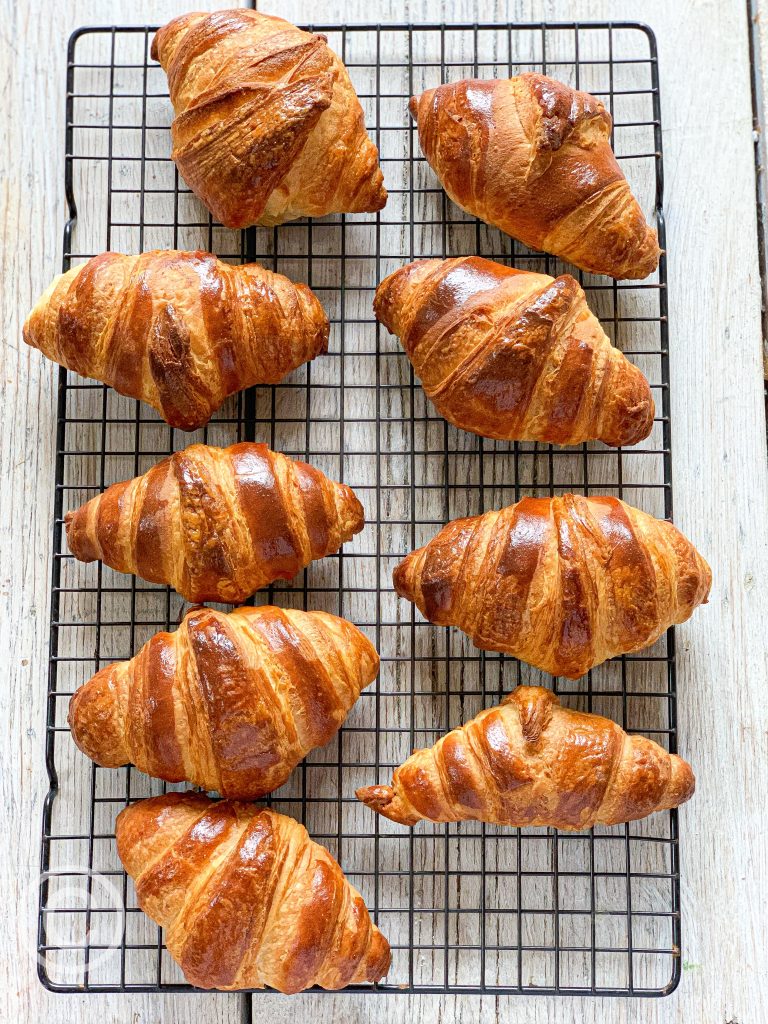
Perfect Croissants
Ingredients
Starter
- 100 g strong white flour
- Pinch fast-action yeast
- 100 ml tepid water
Croissant Dough
- 500 g strong white flour
- 10 g fast-action yeast (or 20g fresh yeast)
- 1 tsp fine sea salt
- 50 g caster sugar
- 150 ml tepid water
- 100 g unsalted butter, room temp, cut into small pieces
- 330 g unsalted butter, cold
- 1 egg, beaten with a little water
Instructions
For the starter
- Start the night before, combine the 100g strong white flour with a pinch of yeast and 100ml tepid water. Cover with a tea towel and leave at room temperature overnight
For the croissant dough
- Tip the remaining 500g of strong white flour into the bowl of a food mixer, along with the remaining yeast, salt and sugar. Using a dough hook, combine then add the starter mixture.
- Add 100g of softened butter, and 150ml of tepid water. Mix on low speed (1 or 2) for 20 minutes. You'll end up with a firm dough.
- Tip the dough on a clean work surface. Take the left side and bring it into the middle, then do the same with the right – like an envelope.Repeat with the bottom and top. Grease a large bowl and put the dough into it, fold side down. Cover with a tea towel and leave for one hour.
- Whack the butter with a rolling pin to flatten it. Then roll out 330g cold butter between 2 pieces of parchment or silpats into a 17 x 19 cm rectangle. Put this in the fridge.
- Make space in your freezer for a small baking tin (30 x 21cm). Line the baking tin with parchment paper.
- Lightly flour a work surface and tip the dough on to it. Pat it out to a rectangle of 25cm x 19cm. Put this into the lined tin. Cover with clingfilm and put in the freezer for 20 minutes.
- Tip the dough onto the lightly floured work surface and dust the top with flour. roll out to a 40 x 20cm rectangle, about 1.5cm thick. Put the chilled butter into the middle and fold the two ends of the dough over the top to cover the butter. Press together to seal.
- Roll out the butter filled dough to 55cm x 22cm. Try to maintain a rectangle with straight sides. Tuck any escaping butter back in. Then fold it in thirds, like a book. Put it back into the tin, cover and freeze for 20 minutes.
- Repeat the above step twice more. Put something good on Netflix for while you wait between steps. I watched Glow, series 2. The wrestling motivated me to do the physical act of rolling.
- Dust the top with flour, roll out to 60 x 22cm. Cut in half so you have two pieces 30 x 22cm. Cover and freeze for 20 minutes.
- Line a large baking sheet with parchment or silpat. Lightly flour the work surface and put one rectangle of dough on it, putting the other in the fridge.
- Roll it out to 45 x 22cm. Measure 10cm along the long straight edge, then cut up to the left hand corner of the dough to make a triangle. To make a second triangle, measure 10 cm along the top and cut down to the bottom. Repeat. You should be able to get 8 triangles.
- One at a time, roll each triangle to 30cm long, concentrating more on the wide part of the triangle. Toll up the dough from the base to the top. You will have a typical croissant shape. Place on the baking sheet. Repeat with the other triangles.
- Remove the dough in the fridge and repeat the last two steps.
- You will now have 15 or 16 croissants on the baking tray. Brush with egg (starting from the inside and working outwards so that the layers of dough do not stick together and prevent the croissants from rising) and leave to prove for 2 hours or until doubled in size.
- At this point you could freeze the pastries, ready to bake another day. Or bake half, freeze half.
- Preheat the oven to 190ºc. Lightly brush the croissants with egg again. Bake for 20 minutes, turning the baking tray around halfway through. Cool on a wire rack.
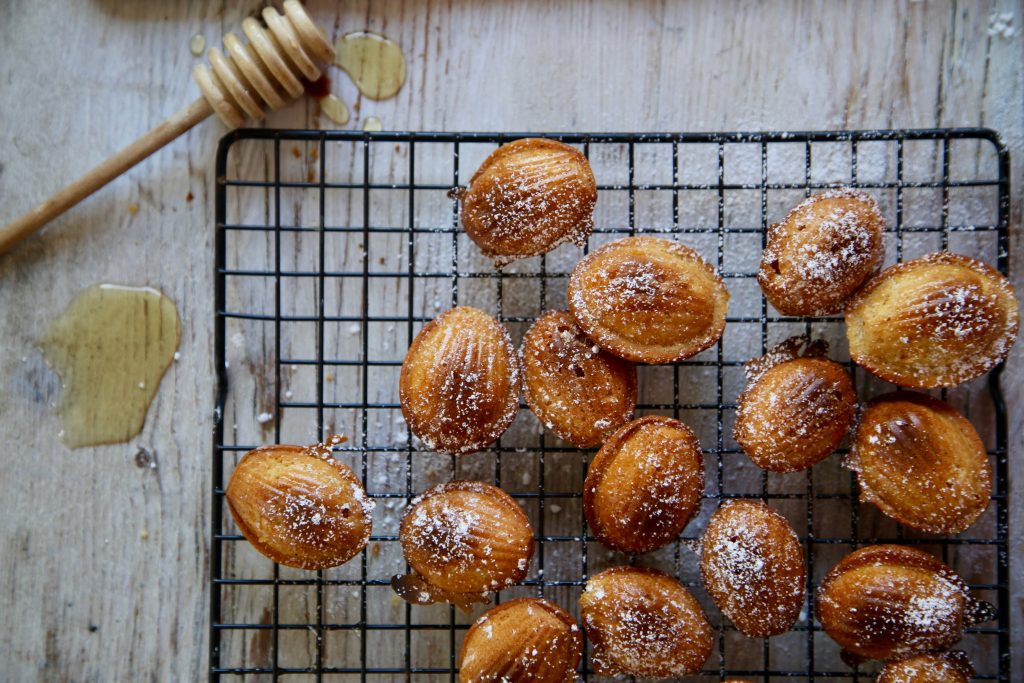
Brown butter madeleines
Ingredients
- 140 g butter plus more for greasing
- 125 g plain flour
- 1 tsp baking powder
- 1/2 tsp fine sea salt
- 2 medium eggs
- 90 g granulated sugar
- 2 tsp runny honey
- 40 ml milk
- icing sugar, to dust
Instructions
- Melt the butter in a saucepan and simmer until pale golden brown. Leave to cool.
- Put the flour, baking powder and salt into one bowl.
- Whisk the eggs, sugar and honey in another bowl until large, pale and fluffy.
- Gradually add the dry ingredients. Then the melted butter and milk. Cover and chill for 2 hours. Felicity says chilling helps give that 'characteristic bump'.
- Grease and flour the madeleine mould, getting into all the little ridges. Put it into the fridge.
- Preheat the oven to 220ºc.
- Put a scant teaspoon of batter into each mould, or pipe the batter in.
- Bake for 7 to 10 minutes until dark golden.
- Cool on a wire rack.
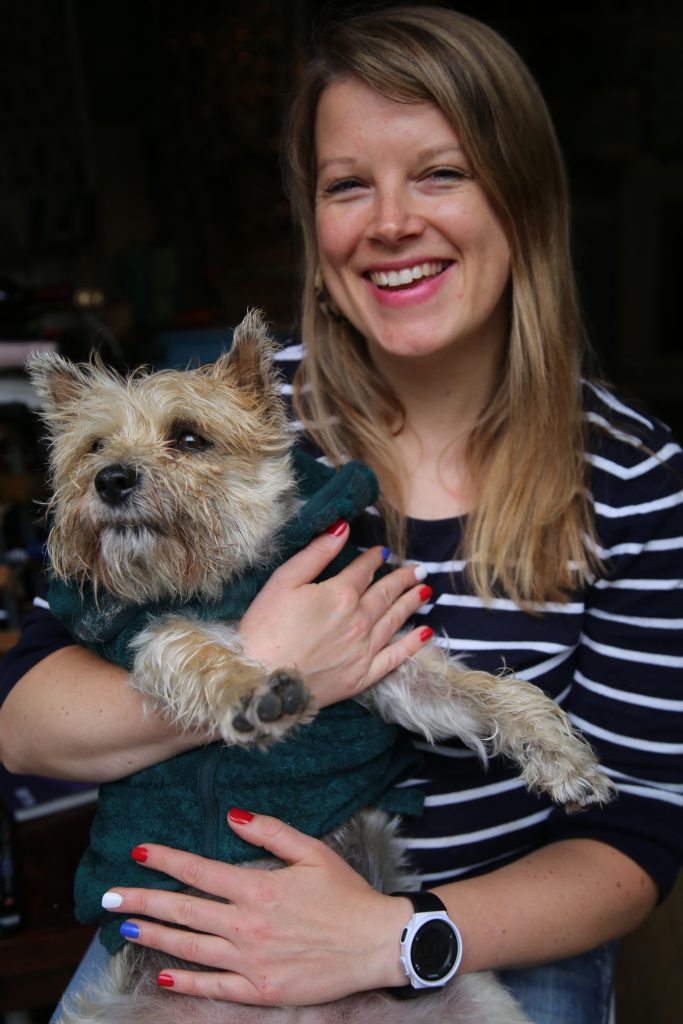

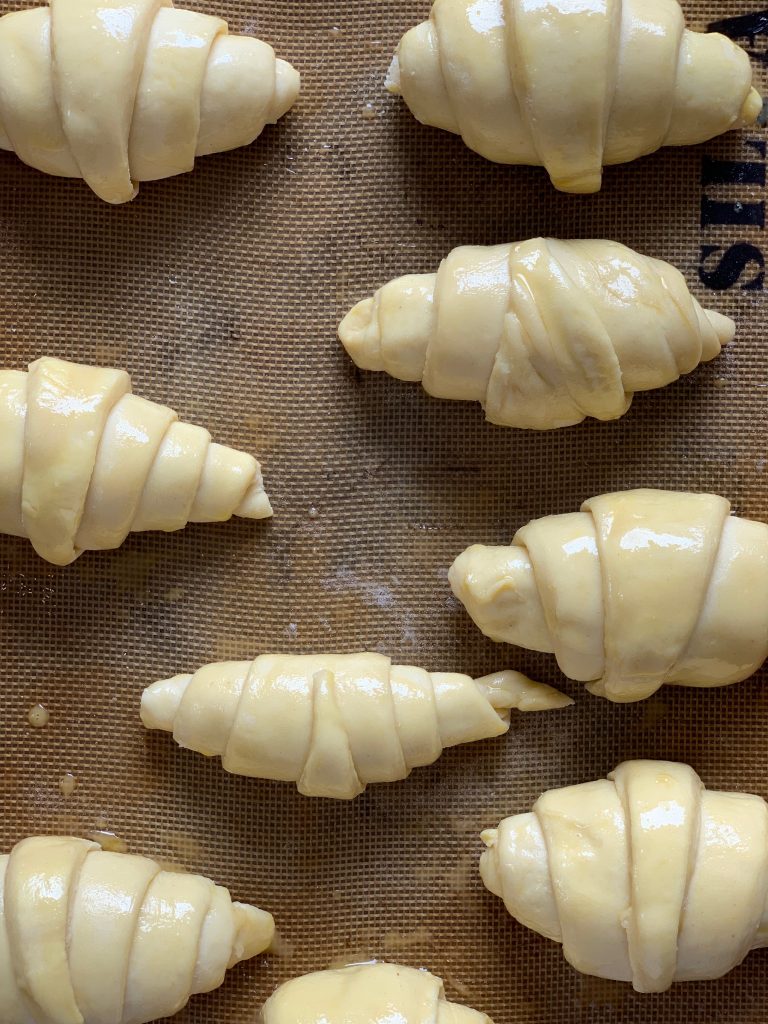



Interesting interview of an interesting woman.
Thanks Trevor
This was great, I love discussing food- all of it- books, techniques, coping strategies for loving it so much, resilience that loving it so much means i’ll never be a skinny minny, but above all ; the experience. I have travelled France with Elizabeth David and MFK Fisher, written about Britain through the eyes and food of my favourite food writers. To me, there is no better chat companion than someone who loves food, but also loves all the human connections it makes. Both of you have this sensibility- and I love reading your work. This was like eavesdropping on two friends who I feel entirely in sync with- allowed and encouraged my own opinion because of ho much we will all learn from each other. Thanks !
Thanks so much Charlotte. I can talk about food till the cows come home. I loved talking to Felicity.
I just read Felicity’s book which I found very interesting amusing and revelatory
Enjoyed the interview too
I have travelled widely in France ( and lived there a long time ago ) before you. could even find a baguette in london
So much so that my sister staying with me in my 13 Franc (£1) per night hotel room in Paris bought several baguettes to take home but all were stale of course after 12 hours of trains and ferries
Also I cycle every Sunday to get a croissant and coffee in Clapham at Deli Boutique
They have two branches and are French owned
Wousk like to hear Felicity’s view on their pastries as I think they are pretty good